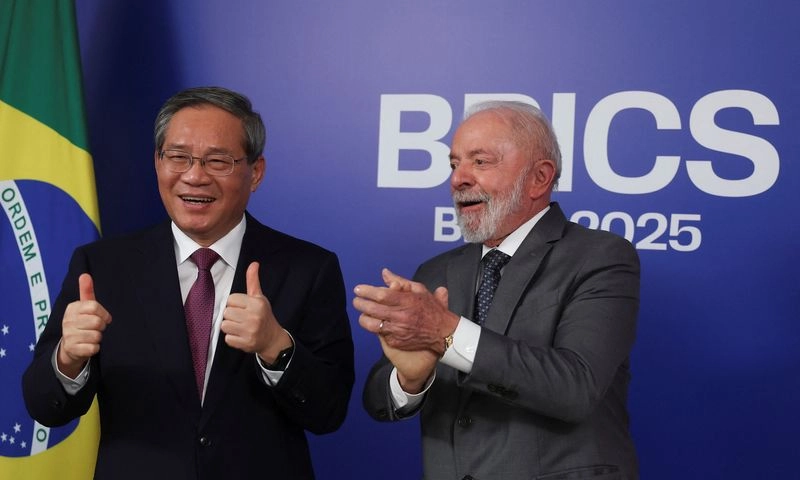- Web
- Feb 05, 2026
Brazil ready to ride out 50pc Trump tariffs, as Lula remains defiant
-

- Reuters
- Aug 05, 2025

BRASILIA: Brazilian goods imported by the United States will soon carry one of the highest tariffs imposed by President Donald Trump, but that will not likely derail Latin America’s largest economy, due to ample exemptions and stronger trade ties with China.
The lower stakes for the Brazilian economy give President Luiz Inacio Lula da Silva more room to stand his ground against Trump than most Western leaders, after calling him an unwanted global “emperor” and comparing his tariff threats to blackmail.
WON’T CALL TRUMP
In his latest statement, Lula said on Tuesday said that his country would use all available resources, including the Word Trade Organization (WTO).
Lula told an event in Brasilia that he would not call Trump because his counterpart did not want to talk, and referred to the day the tariffs were imposed as “the most regrettable” in the two countries’ relationship.
Previously, Lula has said he is open to negotiating a trade deal, but dismissed Trump’s complaints about the trial of right-wing ally Jair Bolsonaro as a threat to Brazilian sovereignty and judicial independence. Brazil’s Supreme Court is trying the ex-president for allegedly plotting to overturn the 2022 election he lost to Lula.
Read more: Bolsonaro arrested despite Trump tariffs as Brazil resists
Those tensions, stoked by Bolsonaro’s on Monday, are likely to make negotiations about the 50 per cent US tariff on Brazilian goods between Washington and Brasilia thorny and drawn out, even as the fallout for Brazil’s economy looks limited.
Read more: Trump tariffs boost Lula approval rating
ONLY 12% EXPORTS TO US, MANY ALTERNATIVES
Unlike Mexico and Canada, which sell about three-quarters of their exports to the United States, Americans buy just 12 per cent of Brazilian exports. By comparison, Brazil’s exports to China have doubled in value over the past decade, now accounting for 28 per cent of the country’s total shipments.
Read more: US tariffs: Reaction from South Africa and Switzerland
After exemptions laid out in Trump’s executive order last week, including on aircraft, energy, and orange juice, the tariff taking effect on Wednesday will apply to just under 36 per cent of Brazilian exports to the US by value, according to estimates in Brasilia.
Many of the affected exports are commodities such as beef and coffee, which should find alternative markets at modest discounts, according to economists.
“We were already expecting a limited impact, but it dropped further with the exemptions,” said Luiza Pinese, an economist at XP, who halved her forecast for the tariff impact on Brazil’s gross domestic product this year to 0.15 percentage points.
BRICS FACTOR
Goldman Sachs maintained its projection for Brazil’s economy to grow 2.3 per cent this year in light of the “notable” exemptions, adding that government support for affected sectors, expected in the coming days, should further soften the economic blow.
“Brazil depends on the United States, that’s true, but also on BRICS countries, on Europe, on Mercosur,” Planning Minister Simone Tebet said at a public event last week, referring to major developing nations such as China, India, and Russia and a South American trade bloc.
She said almost half of Brazil’s agribusiness trade, an engine for Brazil’s economy in recent years, is concentrated in Asia, compared to just 10 per cent with the United States.
“When it comes to industry, the ratio is four to one — four times more to Asia than to the United States,” she added.
SMALLER ROLE FOR TRADE
Brazil is far less open to trade than most major global economies, limiting fallout from trade disruptions.
Exports and imports amounted to 36 per cent of its GDP last year, less than half the share in Mexico and nearby Paraguay, and just a quarter of the level in trade-focused Asian economies such as Thailand and Malaysia, according to World Bank data.
Much of Brazil’s exports are commodities easily redirected to different markets over time, said Thiago Carlos, a PIMCO portfolio manager for emerging markets. In the short term, more domestic food supply may even help to bring down inflation, he added.
“With inflation likely to trend lower, the central bank may find room to begin easing monetary policy sooner than expected,” said Carlos, noting the benchmark rate at the current level of 15% keeps monetary policy extremely tight, dragging on growth.
NO CHANGE IN GROWTH OUTLOOK
Analysts polled by Reuters estimated that even without a US trade deal and before exemptions, Brazil’s growth outlook for 2026 would remain virtually unchanged from their consensus of 1.6 per cent-1.7 per cent.
VULNERABLE SECTORS
Still, Luis Otavio Leal, chief economist at asset manager G5 Partners, warned of potential knock-on effects if government aid is not well targeted to protect vulnerable sectors and jobs.
“Exemptions applied to nearly 700 products — and Brazil exports about 4,000 different goods to the US,” said Leal. “A large number of firms that sell to the US were not covered.”
Brazil’s central bank said on Monday that US levies on Brazilian goods could have “significant” effects on specific sectors, but broader macroeconomic effects are uncertain and will depend on negotiations and market risk perceptions.
Flavio Ataliba, a researcher at Brazilian university FGV, noted that the vast country’s regional variety will result in uneven impacts.
The Northeast region, in particular, could be hit harder due to its export base of low-value-added, labour-intensive goods such as fresh fruit, seafood, textiles, and footwear – all now subject to the full 50 per cent tariff, he added.




